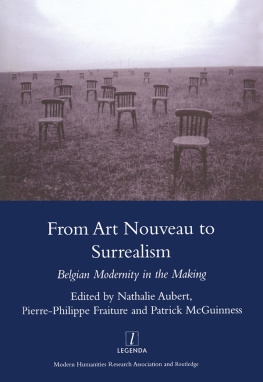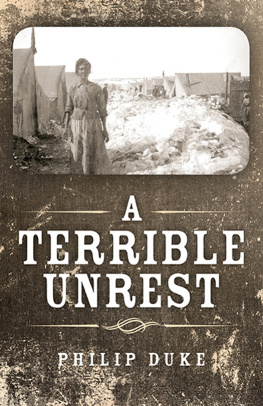
FROM ART NOUVEAU TO SURREALISM BELGIAN MODERNITY IN THE MAKING
LEGENDA
LEGENDA, founded in 1995 by the European Humanities Research Centre of the University of Oxford, is now a joint imprint of the Modern Humanities Research Association and Routledge. Titles range from medieval texts to contemporary cinema and form a widely comparative view of the modern humanities, including works on Arabic, Catalan, English, French, German, Greek, Italian, Portuguese, Russian, Spanish, and Yiddish literature. An Editorial Board of distinguished academic specialists works in collaboration with leading scholarly bodies such as the Society for French Studies and the British Comparative Literature Association.
MHRA
The Modern Humanities Research Association (mhra) encourages and promotes advanced study and research in the field of the modern humanities, especially modernEuropean languages and literature, including English, and also cinema. It also aims to break down the barriers between scholars working in different disciplines and tomaintain the unity of humanistic scholarship in the face of increasing specialization.The Association fulfils this purpose primarily through the publication of journals,bibliographies, monographs and other aids to research.

Routledge is a global publisher of academic books, journals and online resources in the humanities and social sciences. Founded in 1836, it has published many of the greatest thinkers and scholars of the last hundred years, including Adorno, Einstein, Russell,Popper, Wittgenstein, Jung, Bohm, Hayek, McLuhan, Marcuse and Sartre. Today Routledge is one of the worlds leading academic publishers in the Humanities and Social Sciences. It publishes thousands of books and journals each year, serving scholars, instructors, and professional communities worldwide.
www.routledge.com
EDITORIAL BOARD
Chairman
Professor Martin McLaughlin, Magdalen College, Oxford
Professor John Batchelor, University of Newcastle (English)
Professor Malcolm Cook, University of Exeter (French)
Professor Colin Davis, Royal Holloway University of London
(Modern Literature, Film and Theory)
Professor Robin Fiddian, Wadham College, Oxford (Spanish)
Professor Paul Garner, University of Leeds (Spanish)
Professor Marian Hobson Jeanneret,
Queen Mary University of London (French)
Professor Catriona Kelly, New College, Oxford (Russian)
Professor Martin Maiden, Trinity College, Oxford (Linguistics)
Professor Peter Matthews, St Johns College, Cambridge (Linguistics)
Dr Stephen Parkinson, Linacre College, Oxford (Portuguese)
Professor Ritchie Robertson, St Johns College, Oxford (German)
Professor Lesley Sharpe, University of Exeter (German)
Professor David Shepherd, University of Sheffield (Russian)
Professor Alison Sinclair, Clare College, Cambridge (Spanish)
Professor David Treece, Kings College London (Portuguese)
Professor Diego Zancani, Balliol College, Oxford (Italian)
Managing Editor
Dr Graham Nelson
41 Wellington Square, Oxford OX1 2JF, UK
legenda@mhra.org.uk
www.legenda.mhra.org.uk
From Art Nouveau to Surrealism
Belgian Modernity in the Making
EDITED BY NATHALIE AUBERT, PIERRE-PHILIPPE FRAITURE AND PATRICK MCGUINNESS

Modern Humanities Research Association and Routledge 2007
First published 2007
Published by the
Modern Humanities Research Association and Routledge
2 Park Square, Milton Park, Abingdon, Oxon OX14 4RN
711 Third Avenue, New York, NY 10017, USA
LEGENDA is an imprint of the Modern Humanities Research Association and Routledge
Routledge is an imprint of the Taylor & Francis Group, an informa business
Modern Humanities Research Association and Taylor & Francis 2007
ISBN 978-1-904350-64-4 (hbk)
All rights reserved. No part of this publication may be reproduced, stored in a retrieval system, or transmitted in any form or by any means, electronic, mechanical, including photocopying, recordings, fax or otherwise, without the prior written permission of the copyright owner and the publisher.
Product or corporate names may be trademarks or registered trademarks, and are used only for identification and explanation without intent to infringe.
CONTENTS
NATHALIE AUBERT, PIERRE-PHILIPPE FRAITURE AND PATRICK MCGUINNESS
PATRICK MCGUINNESS
ARNAUD RYKNER
LAURENCE BROGNIEZ AND CHARLYNE AUDIN
PIERRE-PHILIPPE FRAITURE
PAUL ARON
PIERRE PIRET
THOMAS AMOS
DANIELLE LEENAERTS
BENOT DENIS
AN PAENHUYSEN
VIRGINIE DEVILLEZ
VALRIE DUFOUR
BIBIANE FRCH
NATHALIE AUBERT
ANDREW HUSSEY
The editors wish to thank Oxford Brookes University, the Modern Languages Faculty of the University of Oxford and the British Academy for their financial help, and John McKeane and Victoria Clouston for their translations.
Leur sens du relatif touche labsolu
LOUIS SCUTENAIRE, Mes Inscriptions
Reading the essays collected in this book, we are struck by the way a number of themes seem to recur, regardless of period (be it the 1890s, the 1920s or the 1940s), genre (poetry, prose, painting or music) or -ism (Symbolism, Surrealism or any of the other more perishable ismes the period threw up). These themes, broadly defined, are distance, doubleness and negation, and they appear in various guises and in different proportions throughout the essays that follow. Indeed, we might consider them to be a sort of Belgian trinity, awkward and intractable, but also enriching and full of unexpected possibilities.
Belgian literary and artistic movements have always explored, and often exploited, their differences from the major international groupings in whose orbits they grew and gained recognition. On the one hand, Belgian avant-garde culture is conscious of its need to harness itself to the big centres of activity, most often Paris. On the other hand, and usually in the same gesture, it demands that it be treated separately, to emphasize its distance from such centres, and its resistance to being co-opted into them. The avant-garde in Belgium seeks to transcend its own national context, all the while asserting how its Belgianness makes it unique, before in turn questioning the very notion of Belgianness. No sooner is a position taken (in relation to oneself and to others) than that position is undermined and exposed. Perhaps more than any European country, Belgium, which gave us Rodenbach, Magritte, Brel, Dotremont and countless other uncategorizable figures, is at home with its own ambiguities.
The Symbolists play a game of distance and proximity with their French counterparts, in part because they are engaged in the project of defining a Belgian literature, and in part because they recognise that their own art benefits from keeping their tensions unresolved. Belgian Symbolism produces disciples, but also prodigal sons occasionally, these turn out to be one and the same. The Surrealists, less interested in the idea of a national literature but perhaps more concerned with autonomy, bring their own more negative dialectics to bear on their relationship with Breton and French Surrealism. Where the French Surrealists focus on revolt and revolution, the Belgians subvert and invert what is already there, whether in language, politics, art or public culture. Who could imagine Symbolism without the Belgians Maeterlinck, Rodenbach and Verhaeren, or Surrealism without Magritte or Scutenaire or Noug? Yet who could imagine a Belgian culture without Symbolism and Surrealism? Both movements find their centres in other peoples margins, and from within those margins they follow their own unique and independent paths. With Dotremont and CoBrA, where this book ends, Belgian avant-gardists are looking elsewhere, to Amsterdam and Copenhagen rather than Paris, seeking to take their places on other artistic stages and open up new cultural dynamics.










